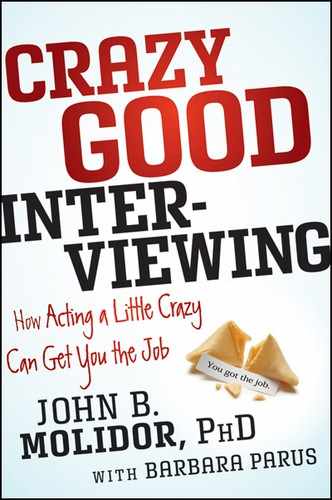Foreword
When I first met John B. Molidor, Ph.D., I fell in love with him. Everyone else does, too.
He's, well, unusual, both as a dean of a college of medicine and as a CEO. He's also unusual because he is a professor of psychiatry and a master presenter. He loves observing people, figuring out what makes them tick, and then teaching us how to use this information.
Along the way, he forgot to grow up. Intentionally. He gets something very few people get: People who make a massive difference take their results seriously and themselves lightly.
He is the epitome of “Let's knock it out of the park…and while we're at it, didja hear the one about the rabbi, the priest, and the minister who walked into a bar and asked to interview the bartender?”
He stays light. He just can't help himself. But don't kid yourself. Even as he's yucking it up, he's moving mountains. One huge area of his expertise is how people perceive others and how they make judgments about them—instantly. This has played nicely into his interest in the selection interview and how it works. But, more importantly, he shows us how to use this information to manage this process.
On so many occasions over the years I've known him, I've seen him light up like a light bulb as he explained to me how he, as one of the deans of the medical school, helped his students get the jobs they want. It's a play-by-play about each student…what they did to get ready for their interview, how they performed in the interview, and how they put it all together to seal the deal.
Just by looking at him, you know this man is no stuffed shirt academic. Take his teaching uniform, for example: dress slacks topped with a Hawaiian shirt in a colorful floral print. Keep in mind that he lives in Michigan with its frigid winters. But, by no means does his casual attire reflect his attitude: He's a man on a mission. He not only taught thousands of people lessons on how to land a job, he taught them a far more powerful and additional lesson: how to be in the workplace and in life. He hammers home the importance of being authentic and being the best you that you can be.
John wrote Crazy Good Interviewing about how to get the job you want, based on his many years of conducting workshops and teaching interview techniques. When the idea for this book was just a seed in his brain, he was searching for the right person to help him germinate his vision. Where would he find such a person?
His keen observational skills, combined with his vast interview experience, led him to Barbara Parus, a writer extraordinaire who has a knack for transforming dry subject matter into fun, reader-friendly prose. The two seemed to be an ideal fit. They are both big-picture people with an irreverent sense of humor. John, who is very methodical and analytical, asked me what it was like working with Barbara, who had interviewed me for a magazine cover story. Happily, I gave her the thumbs up. This set the ball in motion for Crazy Good Interviewing.
Knowing how to interview—using the strategies, behaviors, and skills covered in this book—will help you get the job. But it's also your job to be the same person who showed up for the interview and received the job offer.
Do you remember your first day of work? You arrived with your shirt pressed and your shoes shined. You told everyone that you were going to set the world afire and your pent-up energy was ready to explode. In a perfect world, you were ready to make a difference as a valued member of the team, produce attention-grabbing results, and start climbing the job ladder.
But what if the opposite happened? Two weeks went by and you discovered the work environment wasn't exactly ideal and you worked with a bunch of, well, dweebs—whiners, gossips, and drama queens—all moving relentlessly toward mediocrity! You wondered, “How did this happen?”
You probably forgot that the interview is a two-way process. You were so focused on getting the employer to like you that you didn't pay attention to a bigger question: Do you like them?
If you're a Gen Yer, you might jump ship, only to find that it happens again, and again, and again. There is no perfect workplace.
During my years of speaking, I've asked hundreds of thousands of people if they can relate to that scenario. Wherever I go, without exception, heads nod almost universally. You will need to step up your game of leadership to make your job perfect.
And that is when you get to be the person John shows you how to be in the interview—the woman or man who is filled with passion to make a difference through your work and a leader in helping the people around you get it. You use your interpersonal skills, body language, and powers of persuasion to rally the troops, motivate co-workers, and make meaningful contributions as part of the team.
So, go get that job. Then, if it falls short of your ideal, use your power of three and your unique value proposition to turn it into the job you interviewed for. What if instead of dragging yourself to work each week, you said, “Thank God It's Monday!” and couldn't wait to go to play? Now, that sounds like a good job to me…a crazy good job!
Rock on!
Roxanne Emmerich,
author of Thank God It's Monday!: How to
Create the Workplace You and Your Customers Love
